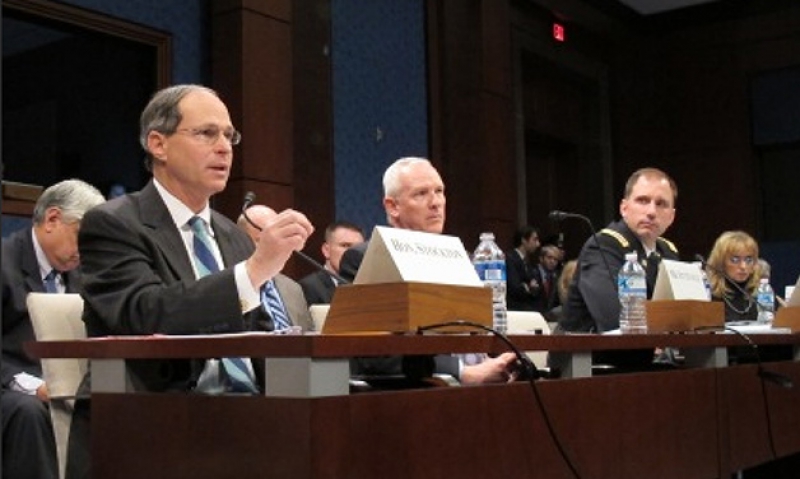
Legion hears of “serious gaps” in military’s preparedness against domestic attacks.
It was only fitting that on the 70th anniversary of the Japanese attack on Pearl Harbor, members of Congress should gather to consider present day threats to American military communities. This time, however, the concern was not with an enemy from afar, but from within our own borders.
Dean Stoline, deputy director of the Legion’s Legislative Division, attended a Dec. 7 Joint House and Senate Homeland Security committee hearing on “Homegrown Terrorism: The Threat to Military Communities Inside the United States.” According to Stoline, the session focused on a 14-page House Homeland Security Committee report telling of “at least 33 threats, plots and strikes against U.S. military communities since 9/11 (that) have been part of a surge of homegrown terrorism.”
The report went on to state that there are “serious gaps” in the “military’s preparedness for attacks against its personnel, dependents and facilities … such as a lack of adequate and clear training in spotting indicators of violent Islamist extremism in individuals who wear the same uniform as those they may target.”
This was a reference to shootings perpetrated by military personnel at Fort Hood, Texas, and at a military recruiting station in Arkansas in which a total of 14 people were killed and more than two dozen injured. Sen. Joe Lieberman, I-Conn., noted that “the only Americans who have lost their lives in terrorist attacks in our homeland since 9/11 have been killed at U.S. military facilities.”
After other references to Islamic terrorists were made during the joint House and Senate hearing, concerns about ethnic and religious “profiling” were raised. Ranking Member on the House Homeland Security Committee, Rep. Bennie Thompson, D-Miss., said that singling out the one ideology – Islam, in this case – as a target of suspicion does, in effect, ostracize certain servicemembers and ignore possible threats posed by those of other persuasions.
“Our military is open to all faiths,” Thompson said. “A congressional hearing that focuses on religion and the military is likely to harm unit cohesion and undermine morale within our military.”
A hearing witness – Jim Stuteville, senior advisor to the Army’s Counterintelligence Operations and liaison to the Federal Bureau of Investigation – responded that, in the wake of the Fort Hood shootings, the military has chosen to train personnel to recognize signs of possible extremism within their ranks by identifying certain behaviors rather than by political or religious profiling. “We adopted that approach because we want to make sure that we can account for any type of threat, both those previously (seen) and those in the future,” he said.
Rep. Dan Lungren, R- Calif., and another witness, Assistant Secretary of Defense Paul Stockton, also discussed profiling based on political ideology and religion. Stockton had represented the point of view that Islam should not, in itself, be indicted by the activities of radical terrorist groups like al-Qaeda.
In response, Lundgren argued that al-Qaeda represented, in his words, “violent Islamist extremism” and that if the U.S. is at war with al-Qaeda, then it follows that the nation is also at war with “violent Islamist extremism.” Stockton defended his point of view by saying that to confuse the two, Islam and violent extremism, would simply aid al-Qaeda’s propaganda efforts.
After witness testimony and questioning, the hearing was closed to the public while members of Congress considered classified information.
The 14-page U.S. House of Representatives Homeland Security Committee report on domestic threats to military interests can be viewed at http://homeland.house.gov/sites/homeland.house.gov/files/Investigative_R...
- Legislative

